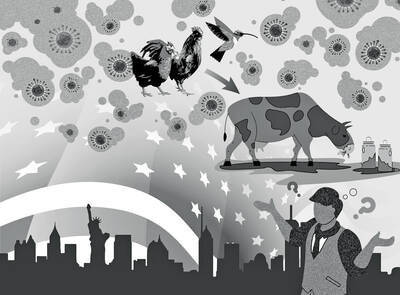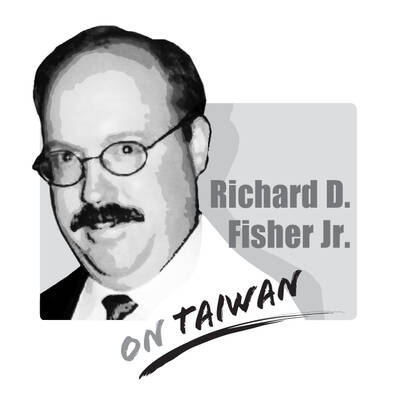The referendum so forcefully supported by the Chinese Nationalist Party (KMT) — to use nuclear power to promote “green” energy — was passed last Saturday.
Ironically, the passage does not mean that an issue has been resolved, but rather that problems have just begun.
“The local government and residents have always been adamant that the Third [Ma-anshan] Nuclear Power Plant should be decommissioned as scheduled,” Pingtung County Government Secretary-General Chiu Huang Chao-chung (邱黃肇崇) said.
“Hengchun residents demand that the Third Nuclear Power Plant be decommissioned on schedule,” Hengchun Township (恆春) Mayor Lu Yu-tung (盧玉棟) said, adding that “if a nuclear power plant or nuclear waste is placed in Hengchun, Hengchun residents have been let down.”
New Taipei City Mayor Eric Chu (朱立倫) — whose municipality is home to the Jinshan and Guosheng nuclear power plants, as well as the nation’s first dry storage facility, which is not being used, although it was completed five years ago — has said: “The city government insists on two things: Whether it is nuclear power plants or nuclear waste, the safety of nuclear power must be guaranteed, and New Taipei City must never become a storage area for nuclear waste.”
“The Fourth [Longmen] Nuclear Power Plant is a patchwork” and is “unsafe,” said Wu Sheng-fu (吳勝福), warden of Renli Borough (仁里) in Gongliao District (貢寮).
“I’m not opposed to nuclear power, but I am definitely opposed to the Fourth Nuclear Power Plant,” Wu said.
Pingtung County, which is ruled by the Democratic Progressive Party, is calling on people to stop demanding that the operational life of the Ma-anshan plant be extended, while KMT-ruled New Taipei City is urging the public to stop demanding that the Fourth Nuclear Power Plant be started up.
Both areas are also saying no to nuclear waste storage — a rare blue-green consensus indeed.
In the real world, reality wins over rhetoric: The disasters at Three Mile Island, Chernobyl and at the Fukushima Dai-ichi nuclear power plants destroyed the illusion of the absolute safety of nuclear power.
Equally serious is that as long as there is nuclear power, there will be nuclear waste. As Taiwan Power Co (Taipower) tries to find permanent nuclear waste storage domestically, people across the nation are saying “not in my backyard,” while finding a permanent storage solution outside Taiwan’s borders has been, and continues to be, impossible.
Taipower’s nuclear power experts are beating their chests and saying that nuclear power is “absolutely safe,” but apart from mumbling to himself that “the safety of nuclear power must be guaranteed,” there is nothing Chu can do but pray that nothing goes wrong at the Jinshan and Guosheng stations.
Why don’t the Taipower experts, who guarantee that nuclear power is “absolutely safe,” and the nuclear power-supporting KMT ask Chu — who is opposed to storing nuclear waste in his city — what he is so afraid of?
Chang Kuo-tsai is a retired National Hsinchu University of Education associate professor.
Translated by Perry Svensson

The bird flu outbreak at US dairy farms keeps finding alarming new ways to surprise scientists. Last week, the US Department of Agriculture (USDA) confirmed that H5N1 is spreading not just from birds to herds, but among cows. Meanwhile, media reports say that an unknown number of cows are asymptomatic. Although the risk to humans is still low, it is clear that far more work needs to be done to get a handle on the reach of the virus and how it is being transmitted. That would require the USDA and the Centers for Disease Control and Prevention (CDC) to get

For the incoming Administration of President-elect William Lai (賴清德), successfully deterring a Chinese Communist Party (CCP) attack or invasion of democratic Taiwan over his four-year term would be a clear victory. But it could also be a curse, because during those four years the CCP’s People’s Liberation Army (PLA) will grow far stronger. As such, increased vigilance in Washington and Taipei will be needed to ensure that already multiplying CCP threat trends don’t overwhelm Taiwan, the United States, and their democratic allies. One CCP attempt to overwhelm was announced on April 19, 2024, namely that the PLA had erred in combining major missions
On April 11, Japanese Prime Minister Fumio Kishida delivered a speech at a joint meeting of the US Congress in Washington, in which he said that “China’s current external stance and military actions present an unprecedented and the greatest strategic challenge … to the peace and stability of the international community.” Kishida emphasized Japan’s role as “the US’ closest ally.” “The international order that the US worked for generations to build is facing new challenges,” Kishida said. “I understand it is a heavy burden to carry such hopes on your shoulders,” he said. “Japan is already standing shoulder to shoulder
Former president Chiang Ching-kuo (蔣經國) used to push for reforms to protect Taiwan by adopting the “three noes” policy as well as “Taiwanization.” Later, then-president Lee Teng-hui (李登輝) wished to save the Chinese Nationalist Party (KMT) by pushing for the party’s “localization,” hoping to compete with homegrown political parties as a pro-Taiwan KMT. However, the present-day members of the KMT do not know what they are talking about, and do not heed the two former presidents’ words, so the party has suffered a third consecutive defeat in the January presidential election. Soon after gaining power with the help of the KMT’s